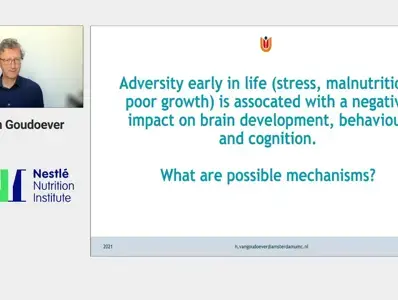Nutrition and stress play a role in altering the maternal biology which affects the foetus in the womb and impact on later neurodevelopmental disorders, mood and cognition. Adversity in early life, though stress and malnutrition, is associated with a negative impact on brain development and behaviour. By far the most important modulation factor in how early life adversity impacts long-term outcome is the hypothalamic-pituitary-adrenal (HPA) axis. Other mechanisms include high levels of oxidative stress, epigenetics, inflammation (notably exposure to proinflammatory cytokines) and deficit of essential nutrients. Perinatal adversity, leading to long-term neurological abnormalities, can be reduced in several ways. Family integrated care programmes reduce mothers’ stress levels. Their diets, through human milk and cystathionine supplementation, can improve their oxidative stress defence mechanisms and adding Omega 3 to mice diets prevented early stress-induced cognitive impairments.

